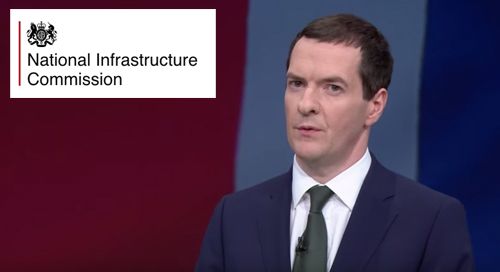

Chancellor George Osborne has unveiled plans for a National Infrastructure Commission (NIC), which will identify the UK’s long-term infrastructure needs for future Parliaments. The formation of such a body has already attracted renewed calls for home energy efficiency to be made a UK infrastructure priority.
Chaired by the former Labour transport secretary Lord Andrew Adonis, the NIC will be created immediately on an interim basis before being put into statue at a later date. It will deliver a long-term plan and assessment of national infrastructure needs early in each parliament, setting out what a Government is expected to do over the next five years. It will be overseen by a small board to be appointed by the Chancellor and will be able to commission research and call for evidence from public sector bodies and private sector experts.
George Osborne, who announced the plans during his party conference speech on Monday (October 5), said: “The Commission will calmly and dispassionately assess the future infrastructure needs of the country and it will hold any Government’s feet to the fire if it fails to deliver.
“I am delighted that the former cabinet minister and transport secretary Andrew Adonis has agreed to be the Commission’s first Chair and help us create Britain’s plan for the future.”
Lord Adonis said: “I look forward to establishing the National Infrastructure Commission as an independent body able to advise Government and Parliament on priorities. I hope it will be possible to forge a wide measure of agreement, across society and politics, on key infrastructure requirements for the next 20 to 30 years and the assessments which have underpinned them.”
The Chancellor has already set the Commission’s first areas of focus to include increasing connectivity of the Northern cities, future investment in London’s public transport and how to ensure investment in energy infrastructure can efficiently meet future demand.
The Energy Bill Revolution, which campaigns to see home energy efficiency recognised as an infrastructure priority, has already called on the NIC and the Government to take notice of its claims. The campaign’s renewed efforts follow a letter recently sent to both the Chancellor and energy secretary Amber Rudd supported by 50 business and energy organisations pointing to new research which claims energy efficiency constitutes infrastructure under the Treasury’s own criteria.
Ed Matthew, director of the Energy Bill Revolution, said: “Our homes are infrastructure too. A programme to make them highly energy efficient must be a recommendation of this Commission. It would create huge economic benefits for the UK, whilst reducing energy bills, carbon emissions and fuel poverty. No other infrastructure investment can do so much for so many.”
As the NIC’s remit will be to consider future infrastructure “of national significance”, including how investment can be used to support housing developments, the Energy Bill Revolution has asked for energy efficiency to be placed back into consideration following the adandonment of the zero carbon homes policy earlier this year.
However, the Commission will not re-examine existing Government infrastructure plans, and will also be subject to limits imposed by the Chancellor, despite its remit to stand politically neutral.
The Commission will publish its initial advice to the Government before the 2016 Budget. It will also begin work on a national infrastructure assessment, looking ahead to requirements for the next 30 years.



